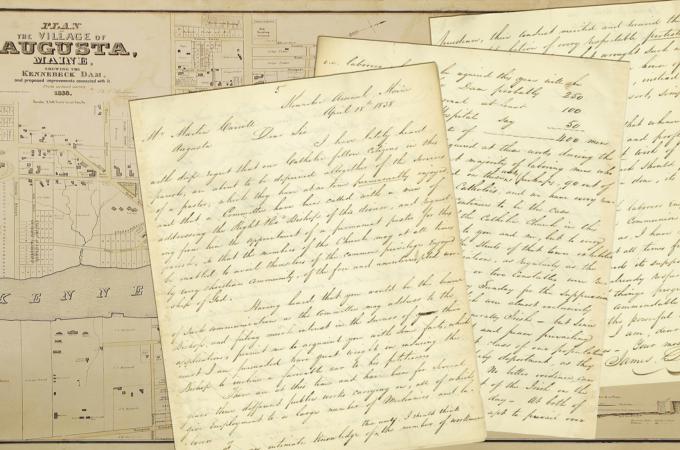The quest for a pastor in Augusta, Maine
On April 18, 1838, James D. Fisher wrote to Martin Carroll from Kennebec Arsenal in Augusta, Maine, describing the effect of the local Catholic Church upon the Irish laborers there.
Fisher reveals in his letter that the coming year in Augusta would call for about 250 laborers to work on the Kennebec Dam, at least 100 to work on the United States Arsenal, and at least an additional 50 to work on a nearby hospital. Based on the current population, he estimates that of the 400 or so laborers, 90 percent would be Irish Catholics.
This follows a common trend during the 19th century, as many cities around New England saw an influx of Irish Catholic laborers who left Boston and other crowded port cities looking for work, and often found employment working on dams, canals, and other public projects further inland. It is significant because as the Catholic population grew in each place, Catholic missionaries followed, and then churches and parishes.
In Augusta, Fisher writes, there was growing concern among the local citizens as they received news that the local pastor, Father Patrick Flood, would be leaving. Prior to the arrival of the first resident pastor, Father John J. Curtin, in 1836, the streets of August were "scenes of riot, tumult, and inebriation," the rioters almost "exclusively of the laboring class, and very generally Irish."
Soon after Father Curtin's arrival, however, "the quiet and peace prevailing had been so remarkable, that that class of our population is now as distinguished for their orderly deportment, as they were formerly for their turbulence." He comments on their particularly commendable behavior during the Fourth of July celebrations and St. Patrick's Day, two holidays which often encourage poor behavior, and he notes that the Protestant population was particular impressed with the change.
"And what wrought such a wonderful change? -- The fact that they had a house of worship to which they could repair on Sundays, instead of spending the day at places of discreditable resort, simply because they had no where (sic.) else to go."
Even the local Protestants, Fisher remarks, desired that the local Catholic Church should prosper, and a committee had been formed by local citizens to address Bishop Fenwick of Boston, petitioning him to assign a permanent pastor so the current tranquility could continue. He claims that the local Catholics should enjoy the right of every Christian, the "free and uninterrupted worship of God." Fisher states that the purpose of his writing Carroll was to "acquaint you (Carroll) with the facts," as the latter was selected to deliver the committee's appeal to Bishop Fenwick.
Regretfully, shortly afterward this episode, an economic recession led Bishop Fenwick to believe that the Catholic population of Augusta would not be able to sustain its own resident pastor and church, and the town reverted to the state of a mission served by Whitefield, Maine. They would not have a pastor regularly assigned to the area until 1845.
- Thomas Lester is the archivist of the Archdiocese of Boston.



















